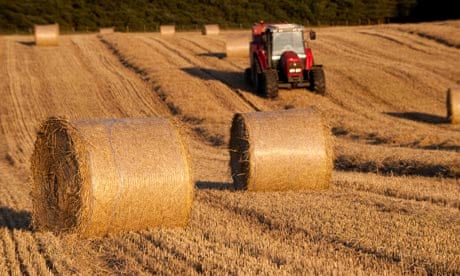
With the challenges of climate change and food and water security, there's never been a greater need for innovative, sustainable farming in the UK. But the industry is facing a severe shortage of new recruits. With the average age of a farmer at 58, the Royal Agricultural Society of England (RASE) report estimates the UK will need 60,000 new entrants over the next decade.

With the challenges of climate change and food and water security, there's never been a greater need for innovative, sustainable farming in the UK. But the industry is facing a severe shortage of new recruits. With the average age of a farmer at 58, the Royal Agricultural Society of England (RASE) report estimates the UK will need 60,000 new entrants over the next decade.
One of the biggest obstacles for aspiring farmers is the cost – especially the increasing price of farmland – and most opportunities arise through succession or inheritance. Startup costs are also high.
But there are encouraging signs. Demand for agricultural courses is increasing, reports Harper Adams University College, which has experienced an 11% increase over the last five years, while the Royal Agricultural College has seen demand increase by 8% this year. Russell Readman, agriculture course manager at Harper Adams, explains that the industry is in a more buoyant mood; the key driver being the need to increase sustainable food production.
Graduates from agricultural courses enjoy exceptionally high employment rates, with Harper Adams in the top three in the country. Readman attributes this success to the year in industry all students undertake during their course, giving them exposure to the workplace and helping them gain key skills – both technical and interpersonal. Employer feedback is that these students have a can-do attitude, while "the applied nature of the courses demonstrates principles in practice".
The diversity of opportunities in farming also contributes to the high employment rates, according to Readman, with the sector offering roles in both food production and ancillary services. It's also a global industry and many students find their transferable skills are useful abroad.
So how can the farming sector attract potential recruits?
Improved careers education and awareness
Greater understanding of the range of opportunities would help dispel the myths that farming is low-skilled and low-paid. The general feeling is that more could be done in schools to promote farming as an aspirational career choice, and to make better links between subjects such as geography or chemistry and their applications in farming.
Campaigns and initiatives
Community supported agriculture(CSA) can help encourage more people into farming by offsetting some of the costs. Farmers receive working capital for investment, and receive a higher return for produce. CSA initiatives can include box schemes, farm shops and farmers' markets, as well as many urban food growing projects, city farms and community gardens. In addition, they help to raise the status of farmers, and promote better links and understanding between rural and urban communities
Other campaigns such as the Making Local Food Work campaign which provides support to community food enterprises and organisations such as the Plunkett Foundation and Sustain help to promote sustainable farming, while events such as Open Farm Sunday can improve understanding of food production, farming and the countryside.
The Royal Agricultural College also invests in school and community events, through its Summer Schools and Field to Plate days (helping school students learn about food production, plant science and nutrition).
Improved training and career progression routes
Lantra, the Sector Skills Council supporting skills and training for people and businesses in the land-based sector, reports that more effective strategies for lifelong learning and professional development are necessary.
With 94% of businesses employing fewer than 10 people, Lantra aims to increase awareness of training and business development. Improving the links between academic research and businesses can promote the innovation and technological change that farming needs to contribute to sustainability challenges.
Apprenticeships are one part of this strategy. The number of these has doubled in the past three years, reports Farmers Weekly, which has also launched its own Farmers Apprentice initiative which aims to encourage young people without a background in farming to become farmers.
The Farming for the Future initiative, launched by Marks & Spencer includes an education programme and provides training and development through bursaries, graduate placements within M&S, scholarships for sustainable (or innovation) projects and postgraduate programmes.
Establishing career progression routes would also make farming a more attractive career, says Will Frazer, from Farmers Weekly. Currently, the system tends to be "haphazard", with little recording of training or skills. He suggests that farming should also be challenged on how it recruits, focusing less on investment in machinery and more on top-quality graduates. Talent and skill must be rewarded if the industry is to recruit people with ambition and entrepreneurial spirit, he adds.
Better PR
Farming needs to offer more inspiring tales focusing on personality traits such as dedication, problem-solving and desire to be your own boss, as well as the satisfaction and personal rewards that can be gained from working in the sector.
Stories that communicate these aspects of farming can also attract those who are tired of corporate values and who have the talent to make a positive social and environmental impact.
This story was originaly published by The Guardian website
Photo credit: Wayne Hutchinson/Alamy

